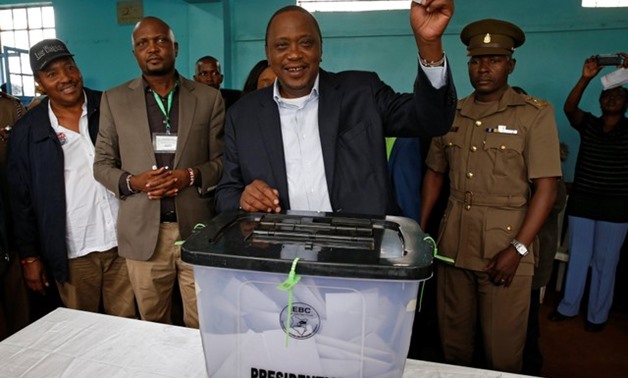
Kenya's President Uhuru Kenyatta casts his vote during a presidential election re-run in Gatundu - REUTERS
KISUMU, Kenya - 26 October 2017: Kenyan opposition supporters clashed with police and threw up burning barricades on Thursday to challenge the legitimacy of an election rerun likely to return Uhuru Kenyatta as president of East Africa's chief economic and political powerhouse.
In the western city of Kisumu, stone-throwing youths heeding opposition leader Raila Odinga's call for a voter boycott were met by live rounds, tear gas and water cannon. There were no immediate reports of casualties and Reuters found no polling stations open.
In Kibera and Mathare, two volatile Nairobi slums, riot police patrolled. Protesters set fires in Kibera early in the morning. Nearly 50 people have been killed by security forces since the original August vote that Kenyatta won but which was annulled by the Supreme Court due to procedural irregularities. The election is being closely watched across East Africa, which relies on Kenya as a trade and logistics hub, and in the West, which considers Nairobi a bulwark against Islamist militancy in Somalia and civil conflict in South Sudan and Burundi.
While tensions simmered in some opposition strongholds, in other areas the situation was calm.
Interior minister Fred Matiang'i told Citizen TV that polling stations opened in over 90 percent of the country, including Kiambu, where Kenyatta cast his ballot.
"We are requesting them (voters) humbly that they should turn out in large numbers," Kenyatta said after voting. "We're tired as a country of electioneering and I think its time to move forward."
If some counties fail to hold elections, it could trigger legal challenges to the run-off and could stir longer-term instability in a country riven by deep ethnic divisions.
On Wednesday, the Supreme Court was due to hear a case seeking to delay the polls, but was unable to sit after five out of the seven judges failed to show up.
"The lack of a quorum is highly unusual for a Supreme Court hearing and has raised serious questions among Kenyan stakeholders, including about possible political interference," a statement from the European Union said.
"Not hearing this case has de facto cut off the legal path for remedy."
OPPOSITION STRONGHOLDS
In Kisumu, the scene of major ethnic violence after a disputed election in 2007, many schools designated as polling stations were padlocked shut. Young men milled about outside.
In Kisumu Central, constituency returning officer John Ngutai said no voting materials had been distributed and only three of his 400 staff had turned up. One nervous official described his election work as a "suicide mission".
"We don't have any options," Ngutai told Reuters as he and two presiding officers sorted thousands of ballot papers into piles, work that should have been completed the previous day.
Kisumu businessman Joshua Nyamori, 42, was one of the few voters brave enough to defy Odinga's stay-away call but could not cast his ballot.
"Residents fear reprisal from political gangs organised by politicians. This is wrong," he said.
In the coastal city of Mombasa, protesters lit tyres and timber along the main highway. Some polling stations had not opened by 8am, and those that did had low turnout and four armed police on guard - double the number on duty last time.
"We are not staying home. We are protesting and ensuring there is no voting around this area," said Babangida Tumbo, 31.
In the western town of Migori, another opposition stronghold, several hundred young men milled around on a main road littered with rubble and burning barricades, according to footage on the domestic NTV channel.
CALL FOR PRAYERS
A decade after 1,200 people were killed over another disputed election, many Kenyans are braced for trouble although on the eve of the vote Odinga backed off previous calls for protests and urged supporters to stay out of the way of police.
"We advise Kenyans who value democracy and justice to hold vigils and prayers away from polling stations, or just stay at home," he said in English.
Odinga's National Super Alliance coalition, which has attacked polling staff in the run-up to the vote, is likely to argue that the lack of open polling stations shows that the re-run is bogus.
The head of the election commission said last week he could not guarantee a free and fair vote, citing interference from politicians and threats of violence against his colleagues. One election commissioner has quit and fled the country.
Kenyatta, the U.S.-educated son of Kenya's founding father, says the vote is legitimate. In central Nairobi, where support for the two protagonists is more mixed, early turnout was significantly down on August.
In a statement issued by the U.S. embassy, foreign missions called for calm but acknowledged that the vote had been damaging to regional stability.
"Following this election, there must be immediate, sustained, open and transparent dialogue involving all Kenyans to resolve the deep divisions that the electoral process has exacerbated," it said.


Comments
Leave a Comment